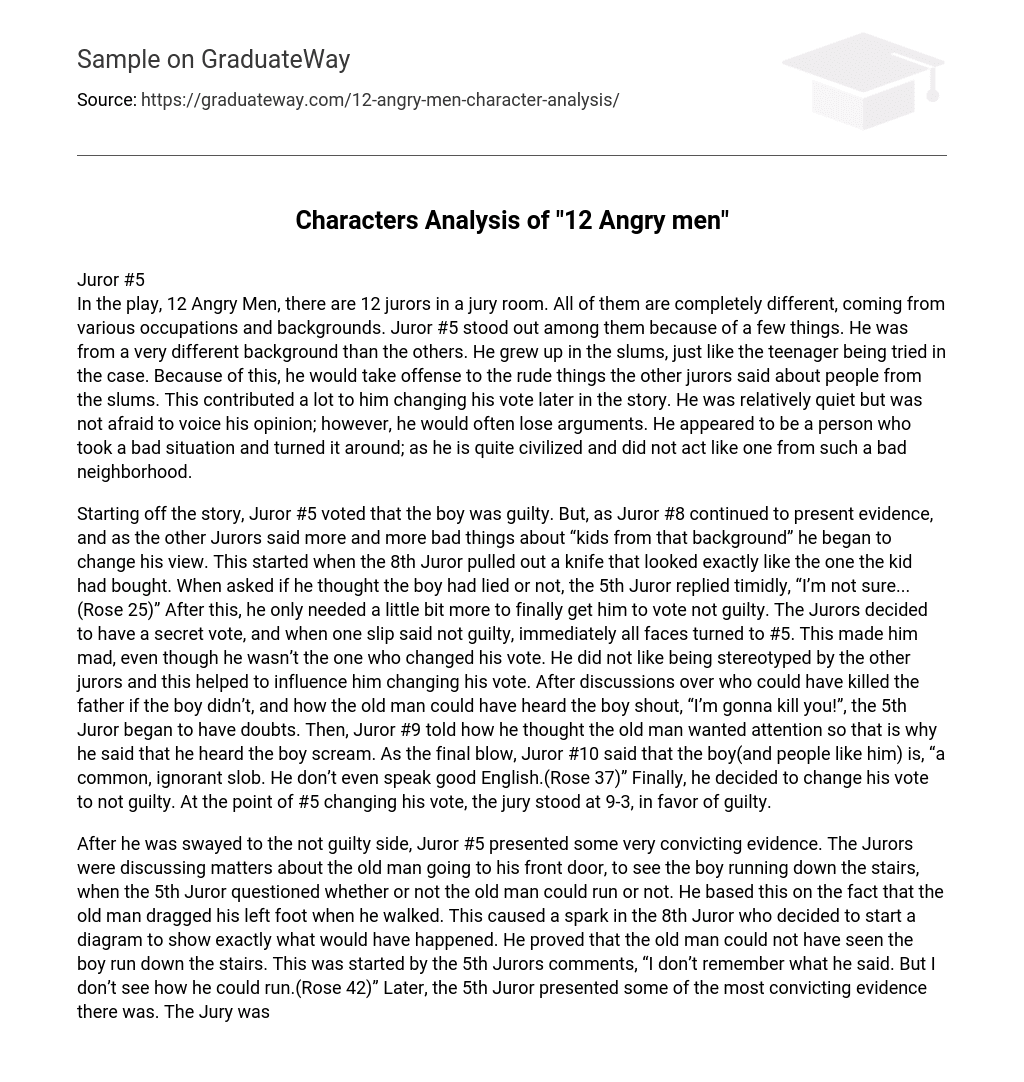Juror #5
In the play, 12 Angry Men, there are 12 jurors in a jury room. All of them are completely different, coming from various occupations and backgrounds. Juror #5 stood out among them because of a few things. He was from a very different background than the others. He grew up in the slums, just like the teenager being tried in the case. Because of this, he would take offense to the rude things the other jurors said about people from the slums. This contributed a lot to him changing his vote later in the story. He was relatively quiet but was not afraid to voice his opinion; however, he would often lose arguments. He appeared to be a person who took a bad situation and turned it around; as he is quite civilized and did not act like one from such a bad neighborhood.
Starting off the story, Juror #5 voted that the boy was guilty. But, as Juror #8 continued to present evidence, and as the other Jurors said more and more bad things about “kids from that background” he began to change his view. This started when the 8th Juror pulled out a knife that looked exactly like the one the kid had bought. When asked if he thought the boy had lied or not, the 5th Juror replied timidly, “I’m not sure…(Rose 25)” After this, he only needed a little bit more to finally get him to vote not guilty. The Jurors decided to have a secret vote, and when one slip said not guilty, immediately all faces turned to #5. This made him mad, even though he wasn’t the one who changed his vote. He did not like being stereotyped by the other jurors and this helped to influence him changing his vote. After discussions over who could have killed the father if the boy didn’t, and how the old man could have heard the boy shout, “I’m gonna kill you!”, the 5th Juror began to have doubts. Then, Juror #9 told how he thought the old man wanted attention so that is why he said that he heard the boy scream. As the final blow, Juror #10 said that the boy(and people like him) is, “a common, ignorant slob. He don’t even speak good English.(Rose 37)” Finally, he decided to change his vote to not guilty. At the point of #5 changing his vote, the jury stood at 9-3, in favor of guilty.
After he was swayed to the not guilty side, Juror #5 presented some very convicting evidence. The Jurors were discussing matters about the old man going to his front door, to see the boy running down the stairs, when the 5th Juror questioned whether or not the old man could run or not. He based this on the fact that the old man dragged his left foot when he walked. This caused a spark in the 8th Juror who decided to start a diagram to show exactly what would have happened. He proved that the old man could not have seen the boy run down the stairs. This was started by the 5th Jurors comments, “I don’t remember what he said. But I don’t see how he could run.(Rose 42)” Later, the 5th Juror presented some of the most convicting evidence there was. The Jury was discussing the knife and how it was stabbed into the body, when the 5th Juror, who grew up with switch knives, suddenly remembered how they were meant to be used. The other Jurors were showing it to be used in an overhand motion, while the 5th Juror showed that they were meant to be used underhanded. He said, “Anyone who’s ever used a switch knife’d never handle it any other way.(Rose 61)” After this, there was overwhelming evidence that the boy might not have committed the crime. The 5th Juror contributed greatly to the evidence.
After reading 12 Angry Men, I could not decide on which Juror to analyze. I decided on Juror #5 because of how different he was and the evidence he presented. He presented the case in a way that was very different than all the others. His evidence was not arguable, because of his background. Because of his testimony, the jury and the reader were persuaded. I thought the boy was innocent. The parts of the case we heard from the book, although they looked very convicting at first, when looked at in the right way, actually made it seem like the boy was innocent. He was just someone who was subject to stereotype because of his background and affiliation. I believe the boy was innocent.





